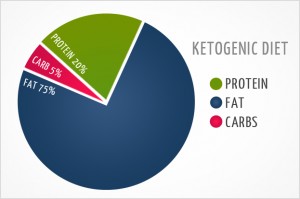Is the Ketogenic Diet a Cancer Cure?
The ketogenic diet is a low carbohydrate diet, in essence, with an emphasis on high levels of healthy fats. While first developed for those seeking fast weight loss, the diet has shown strong therapeutic benefits when it comes to the prevention and management of chronic diseases, leading many doctors to recommend it to their patients.
Why is it so effective?
It is well known by now that diets high in protein and low in carbohydrates aid weight loss, leading to an increased loss of body fat and reduced loss of muscle (lean body mass). People on these diets feel fuller, longer, experience increased thermogenesis (rise in core body temperature), and have better-regulated blood sugar levels due to a lower insulin response.
The ketogenic diet in particular has shown several health benefits, such as reducing the formation of plaques on the arteries and a diminished resistance to insulin while maintaining better blood glucose levels, which has a wide range of positive implications: the reduction of diabetes, polycystic ovary syndrome, acne, neurological diseases, respiratory and cardiovascular disease, and, perhaps most interesting of all, the reduction of cancer.
A recent study published in the journal Nutrition & Metabolism investigated the effects of the ketogenic diet on the overall quality of life of patients with advanced metastatic heterogeneous tumours. All sixteen patients studied showed a significant improvement in their quality of life and blood parameters after several months of adhering to a ketogenic diet.
The ketogenic diet was found to inhibit glycolysis, a process which aids cancer cells in invasion and metastasis. The ketogenic diet restricts the cancer cells’ supply of glucose while still feeding the body with a blend of 60% medium-chain triglycerides oil, 20-25% protein, 10% carbohydrates, and 5-10% fat (particularly the famously healthy Omega-3 fats). This induces ketosis, a sort of “false starvation” in which the body exhausts the glucose supply in the liver and then turns to fat for energy. This diet has a detrimental impact on the enzymes phosphofructokinase and lactate dehydrogenase, which are part of how cancer cells produce energy.
cancer cells’ supply of glucose while still feeding the body with a blend of 60% medium-chain triglycerides oil, 20-25% protein, 10% carbohydrates, and 5-10% fat (particularly the famously healthy Omega-3 fats). This induces ketosis, a sort of “false starvation” in which the body exhausts the glucose supply in the liver and then turns to fat for energy. This diet has a detrimental impact on the enzymes phosphofructokinase and lactate dehydrogenase, which are part of how cancer cells produce energy.
To get the best out of the ketogenic diet, strictly adhere to it for 52-60 days, then modify it to diet that is low in sugar, high in vegetables, and has a moderate amount of fat and protein. Supplements to take during this diet include antioxidants, fibres, citric acids, acetyl-l-carnitine, pancreatic enzymes, choline, taurine and vitamin C, along with fibre prebiotics and probiotics for ideal bowel function. Alkalising buffers are optional to reduce possible acidity, as sometimes accompanies low-carbohydrate diets.
What foods should you eat while on the ketogenic diet?
Where the ketogenic is low in carbohydrates, obviously you will need to avoid cakes, biscuits, crackers, donuts, pasta, and other grain products, including rice. It is also vital to avoid sugary drinks, fruit juices, honey, jam, candy, and other sources of sugar (glucose). You’ll also need to avoid fruit, as it is a natural source of glucose and carbohydrates, and berries as well.
Certain unhealthy fats must also be avoided, such as Margarine, canola, safflower and sunflower oils.
You may, however, have eggs, seafood, dairy products, meat, beans and lentils, nuts, and a range of low-glucose vegetables. These include many popular choices, such as avocado, broccoli, cabbage, cauliflower, celery, eggplant, garlic, kale, lettuce, leeks, mushrooms, green and red peppers, radishes, spinach, string beans, summer squash, turnip, zucchini, tomatoes, and more. You may include citrus, such as limes and lemons.
You may enjoy healthy fats in the form of butter, linseed oil, fish oil, lard, olive oil, sesame oil, coconut oil, ghee, and copha.
Contact the clinic now for more information regarding the Ketogenic diet and natural cancer support. Read more on the Cancer Diet.
